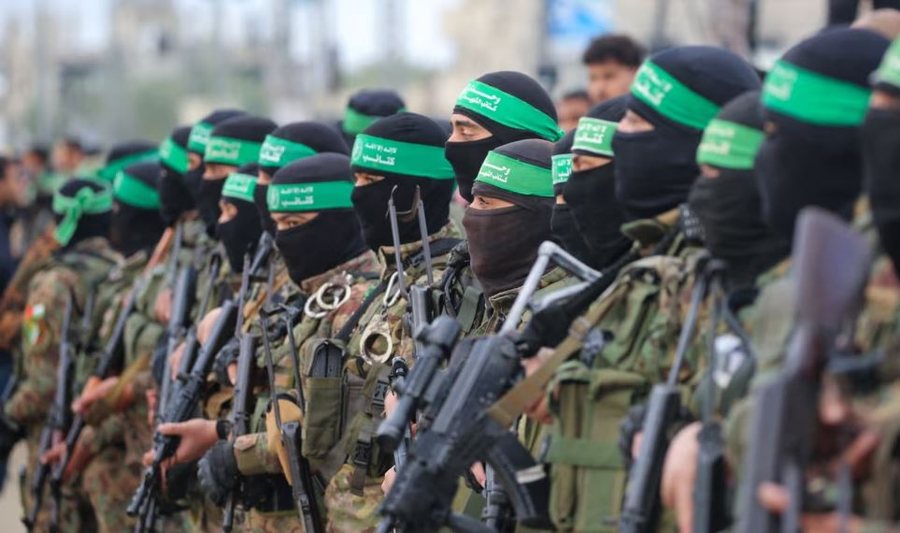
After US President Donald Trump hinted that the ceasefire agreement between Israel and Hamas would be canceled if all hostages were not released by Saturday, an official with the Palestinian militant group said the only way to free the hostages was to respect the terms of the ceasefire agreement.
Mr. Trump made the statement after the Hamas group accused Israel of violating the ceasefire and threatened to delay the release of three hostages, who, according to the ceasefire, should be released on Saturday.
"As far as I'm concerned, if all the hostages are not returned by 12 noon on Saturday, I think it's time, I would say, call it off and let the war break out," President Trump told reporters at the White House.
On Tuesday, senior Hamas official Sami Abu Zuhri told reporters that President Trump's comments complicate the ceasefire.
"Trump should remember that there is an agreement that must be respected by both sides and this is the only way to return the prisoners," he said. "The language of threats has no value and only complicates things."
The militant group Hamas said on Monday that no more hostages would be released until further notice. The group, designated a terrorist organization by the United States and several other countries, accused Israel of delaying the return of displaced Palestinians to northern Gaza, even though hundreds of thousands of them have already returned.
The militant group also said Palestinians were being targeted “by airstrikes and gunfire in various areas” and added that Israel had failed “to facilitate the entry of humanitarian aid as agreed.” A United Nations official said 12,600 trucks of humanitarian aid had entered Gaza since the ceasefire began and that the risk of starvation had been overcome.
Israeli Defense Minister Israel Katz says any delay by Hamas would be a "complete violation" of the ceasefire agreement. He placed the Israeli military on the highest level of alert.
Since the ceasefire took effect last month, Hamas has released 21 hostages and Israel has freed more than 730 prisoners. The next exchange on Saturday sees the release of three more Israelis in exchange for hundreds of Palestinians held by Israel.
In Paris, United Nations Secretary-General Antonio Guterres called on Hamas to adhere to the planned release of the hostages.
"We must avoid at all costs the resumption of hostilities in Gaza, which would lead to a great tragedy," he said. "I call on Hamas to proceed with the planned release of the hostages on Saturday."
"Both sides must fully respect their commitments in the ceasefire agreement and resume serious negotiations in Doha for the second phase," Mr. Guterres said.
The Gaza Plan
President Trump has proposed relocating Palestinians living in Gaza to other countries. Under his plan, the United States would take control of Gaza and the Palestinians would not have the right to return.
In an interview with the American network 'Fox News' broadcast on Monday, he called his plan for the territory along the shores of the Mediterranean Sea a "plan for future real estate development."
"I would take control," he said, adding that 2.3 million Palestinians now living in war-torn Gaza would be relocated to six other countries, under a plan that both the Arab world and the United States' allies and adversaries have rejected.
President Trump met with Jordan's King Abdullah at the White House on Tuesday.
"I think he (King Abdullah) will accept" refugees, President Trump said Monday of the Jordanian leader.
Asked if he would cut off aid to Jordan and Egypt if they refused to do so, President Trump said: "Yeah, maybe, sure, why not ... if they don't agree, I would cut off aid to them."
King Abdullah has rejected any attempt to annex territory and displace Palestinians. He is expected to tell President Trump that such a move could fuel radicalism, spread chaos in the region, jeopardize peace with Israel and threaten the survival of his country.
Meanwhile, Egyptian Foreign Minister Badr Abdelatty told US Secretary of State Marco Rubio on Monday that Arab states reject the plan to displace Palestinians and for the United States to take control of the Gaza Strip.
Egyptian Foreign Minister Abdelatty stressed the importance of the Palestinians' stay in Gaza as the territory is rebuilt.
After the meeting, the State Department issued a statement that did not directly mention President Trump's plan, but added that Secretary Rubio "reiterated the importance of working closely together to work toward post-war plans for security and governance in Gaza. The statement also emphasizes that the Hamas group must never govern Gaza or threaten Israel again."
Armistice conditions
During the first six weeks of the ceasefire, the Hamas group gradually released 33 Israeli hostages it had taken during the October 7, 2023 attack. The hostages were released in exchange for a cessation of fighting, the release of hundreds of Palestinian prisoners by Israel, and the allowing of humanitarian aid into Gaza.
The agreement also states that the Israeli army will withdraw from populated areas in Gaza and will vacate the Netzarim corridor that separates the northern and southern parts of the Gaza Strip.
On Sunday, Israeli troops withdrew from the corridor, allowing more Palestinians to return to the northern part where they previously lived, an area that has seen extensive destruction.
In the second phase, all remaining hostages would be released in exchange for Israel's complete withdrawal from the Gaza Strip and the provision of "sustainable calm." Details for the second phase are still unclear and must be negotiated.
The war in Gaza began after Hamas's October 2023 terror attack on Israel, in which 1,200 people were killed and 250 others were taken hostage. According to health officials in Hamas-controlled Gaza, Israel's military response has killed more than 47,000 people. Israel says the death toll includes 17,000 militants.
Some information for this article was obtained from the news agencies "Associated Press", "Agence France-Press" and "Reuters"./ VOA (A2 Televizion)











